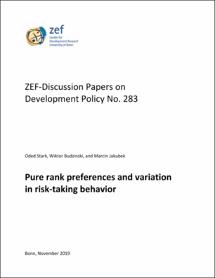Stark, Oded; Budzinski, Wiktor; Jakubek, Marcin: Pure rank preferences and variation in risk-taking behavior. Bonn: Center for Development Research (ZEF), University of Bonn, 2019. In: ZEF-Discussion Papers on Development Policy, 283.
Online-Ausgabe in bonndoc: https://hdl.handle.net/20.500.11811/12071
Online-Ausgabe in bonndoc: https://hdl.handle.net/20.500.11811/12071
@techreport{handle:20.500.11811/12071,
author = {{Oded Stark} and {Wiktor Budzinski} and {Marcin Jakubek}},
title = {Pure rank preferences and variation in risk-taking behavior},
publisher = {Center for Development Research (ZEF), University of Bonn},
year = 2019,
month = nov,
series = {ZEF-Discussion Papers on Development Policy},
volume = 283,
note = {Assuming that an individual’s rank in the wealth distribution is the only factor determining the individual’s wellbeing, we analyze the individual’s risk preferences in relation to gaining or losing rank, rather than the individual’s risk preferences towards gaining or losing absolute wealth. We show that in this characterization of preferences, a high-ranked individual is more willing than a low-ranked individual to take risks that can provide him with a rise in rank: relative risk aversion with respect to rank in the wealth distribution is a decreasing function of rank. This result is robust to incorporating (the level of) absolute wealth in the individual’s utility function.},
url = {https://hdl.handle.net/20.500.11811/12071}
}
author = {{Oded Stark} and {Wiktor Budzinski} and {Marcin Jakubek}},
title = {Pure rank preferences and variation in risk-taking behavior},
publisher = {Center for Development Research (ZEF), University of Bonn},
year = 2019,
month = nov,
series = {ZEF-Discussion Papers on Development Policy},
volume = 283,
note = {Assuming that an individual’s rank in the wealth distribution is the only factor determining the individual’s wellbeing, we analyze the individual’s risk preferences in relation to gaining or losing rank, rather than the individual’s risk preferences towards gaining or losing absolute wealth. We show that in this characterization of preferences, a high-ranked individual is more willing than a low-ranked individual to take risks that can provide him with a rise in rank: relative risk aversion with respect to rank in the wealth distribution is a decreasing function of rank. This result is robust to incorporating (the level of) absolute wealth in the individual’s utility function.},
url = {https://hdl.handle.net/20.500.11811/12071}
}






